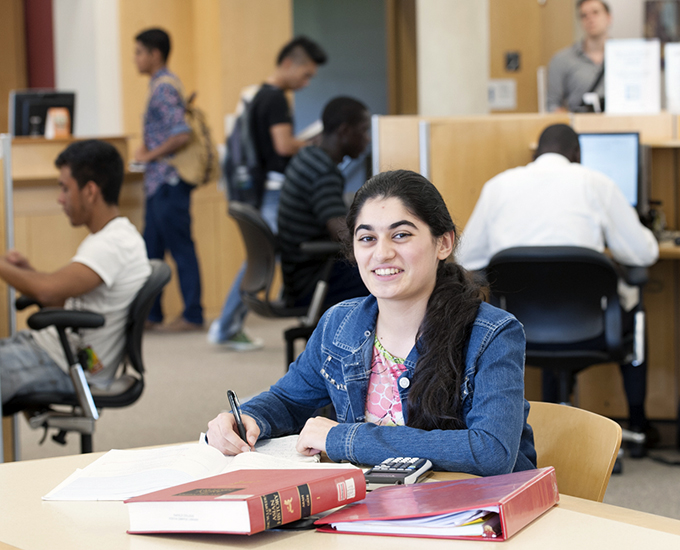
Sarah Ghalayini says her GPC dual enrollment experience is preparing her for life after high school. (photo by Bill Roa)
Dual Enrollment at record high at Georgia Perimeter College
Sarah Ghalayini isn’t quite sure what career path she’ll eventually take, but the 17-year-old Georgia Perimeter College dual enrollment student is exploring a broad range of possibilities including biomedical engineering, intellectual property law and neuro-oncology.
“But that can all change at a moment’s notice,” she says.
Ghalayini is certain, however, that she made the right choice in deciding to participate in GPC’s Dual Enrollment program, which enables qualified high-school juniors and seniors like herself to take college classes, while also satisfying the requirements for a high-school diploma.
“I am much better prepared for life after high school because of the dual enrollment program at GPC and am looking forward to applying the skills I have learned in the environment of a four-year college and beyond,” says the Fulton Science Academy High School senior and GPC Dunwoody student.
Georgia Perimeter’s DE program is attracting students like Ghalayini in record numbers. There are 1,150 of them enrolled in nearly 6,000 credit hours on GPC’s five campuses and online.
Georgia Perimeter, according to Jeff Meadors, the college’s dual enrollment coordinator, educates more DE students than any other school in the University System of Georgia. GPC Alpharetta leads the DE roster with 736 participants, followed by Dunwoody and Newton campuses, with 197 and 144 respectively.
“Since around 2009, the overall college DE enrollment has increased with minor dips along the way due to changes in legislation which impact costs,” Meadors says of dual enrollment, which is offered to students tuition-free.
Active recruiting gets big credit for the enrollment increase.
“There tends to be a direct relationship between time spent in high schools by dual enrollment staff and the enrollment numbers,” Meadors explains.
He also points to quality academic advising as a reason for the college’s ability to grow its DE numbers.
Kay Harrison, who oversees dual enrollment at Alpharetta Campus, cites several benefits to students and their families.
“In these times where four-year schools are getting more competitive, it (DE) gives high school students an edge in that they have already had experience at a collegiate level and have proven themselves successful,” Harrison says.
Free tuition, credit transferability and the fact that DE courses do not impact the number of classes the HOPE scholarship will fund are added bonuses, Harrison believes.
Most Georgia Perimeter DE students earn a total of between three and 15 credit hours. Ghalayini currently is taking a full load of classes at GPC and carrying a 4.0 GPA. She’ll graduate from Fulton Science Academy in May with approximately 50 college credits—and what she considers an immeasurable experience.
“Dual enrollment is more than a way for high school students to get ahead in their studies,” Ghalayini says. “It’s a way for them to explore their interests and their identity. Since the college years are typically a time for self-discovery, dual enrollment provides a medium through which students can get a head start on the exploration of their passions.”
